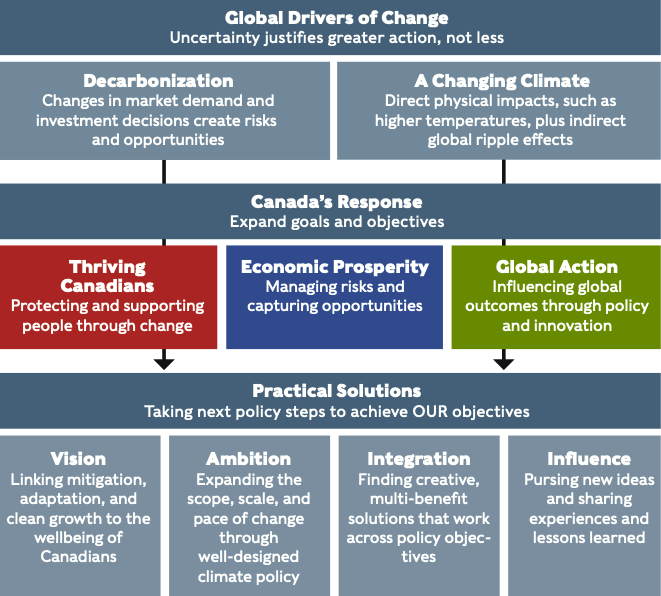Canada and Canadians can weather the storm—but only if we take an integrated approach to preparing for the changes that are coming. We can manage risks and capture opportunities. We can protect and support those who are vulnerable. And we can leverage our ability to influence global outcomes. This implies a broader set of climate change goals and objectives than we have seen in the past, that better reflect the diversity of needs and interests across Canada. Climate change has wide-reaching implications for Canada; to prepare, our response must be just as broad.
Well-designed climate policies—at all level of governments—can help Canada make deliberate choices that lead to cleaner and more inclusive growth, and a resilient and prosperous future for Canada. To chart Canada’s course, we must build on our successes, moving toward broader, more ambitious, more coordinated, and more integrated policy solutions (Figure 8).

FIGURE 8: Charting our Course on Climate Change
To move forward, we propose four recommended next steps for all levels of Canadian governments to consider:
RECOMMENDATION #1:
Canadian governments should broaden objectives for climate policy
Historically, governments have focused on relatively narrow objectives (achieving emissions-reduction targets, managing specific climate risks). Yet we have often failed to deliver on these objectives, and we remain largely unprepared for future challenges. A broader perspective on policy design—looking beyond the narrow lenses of mitigation, adaptation, and clean growth—can help to clarify what governments are trying to achieve, embed climate change objectives in all policy choices, and guide more innovative policy solutions. By linking objectives more directly to the welfare of Canadians, this approach can also build a broader coalition of support for action.
Canadian governments—at all levels—have roles to play in delivering a future Canada that is resilient to the changes ahead, for our climate and our economy.
RECOMMENDATION #2:
Canadian governments should embrace Canada’s role in global outcomes
Canada has the potential to influence global change, rather than merely respond to it. We are among the largest economies in the world and have a seat at the table of global leadership through organizations such as the United Nations, G7 and G20. We are also one of the world’s largest emitters. We should think strategically about what we can do to drive the action needed to produce better global outcomes. For example, we can demonstrate global leadership through our own actions, we can work internationally to help solve policy challenges that are driving global risks, and we can develop technologies and products that make transition easier and more cost- effective—while realizing economic benefits and new opportunities for Canadian businesses and workers.
RECOMMENDATION #3:
Canadian governments should expand the scope, scale, and pace of climate policies
It is not enough to just develop policies aimed at addressing climate change. The policies must also have sufficient ambition. This means expanding the coverage of policies across regions, issues, and sectors, ramping up the magnitude of change, and tightening the timeframe for achieving results. We need to think about where we want to be in 2050 and beyond, and work backwards to determine optimal pathways and choices. Decisions made today should lay the groundwork for long-term success. Canada has made considerable progress in the last decade, but overall action has not been commensurate with the scale of the challenges ahead.
RECOMMENDATION #4:
Those analysing and developing policy options should seek out integrated solutions that drive multiple benefits
The complexity and multi-dimensional nature of climate change, combined with the need for greater ambition, demands a more integrated and comprehensive approach to finding solutions. The most effective policies will achieve multiple benefits across a range of climate change and other policy objectives. But the best way to identify and develop these policies is by breaking down traditional policy silos and bringing people with different expertise, backgrounds, and perspectives together.
Our proposed next steps for Canada are not easy, but they are achievable. Success will rely on strong leadership, openness to new ideas, willingness to collaborate, and innovative thinking.
Research organizations such as the Canadian Institute for Climate Choices can support Canada’s journey to 2050 and beyond by bringing together top experts from a range of disciplines to analyse pathways, evaluate policy options, and point to solutions that serve the best interests of current and future generations of Canadians.
This report is only a starting point. It frames important new policy and research questions. Hard work from a very broad group of Canadians will be required to answer these questions and help guide Canada to a resilient and prosperous future with cleaner and more inclusive growth.

